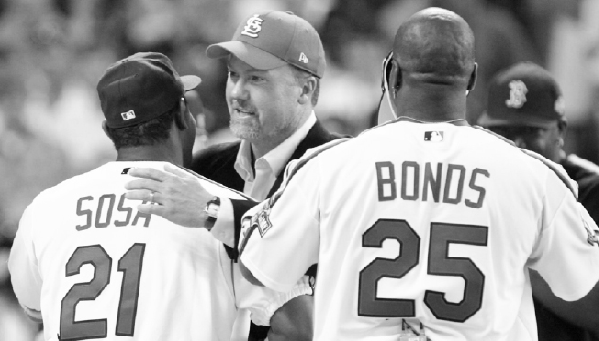Commentary: Regardless of steroid use, let them in the Hall of Fame

By Facebook user theScore
February 9, 2016
From Mark McGwire to Barry Bonds to Sammy Sosa, Major League Baseball has featured some of the premier home run hitters ever to step up to the plate.
The mid 1990s to early 2000s era was filled with some of the finest hitters our generation had ever witnessed. Yet the era will forever be tainted by one thing: steroids.
Steroids have been the revolving factor in a long-standing debate: should the users of steroids be allowed to grace the walls of the MLB Hall of Fame?
If you ask the average baseball fan that question, the majority would say that steroid users would have no place in baseball. Fans have had a bitter taste left in their mouths over how poorly the steroid players stained the reputation of Major League Baseball. Since said players set records we may never see broken again, we should allow them entry. The players altered the record books of baseball, why could they not alter the Hall of Fame?
Fox Sports analyst Colin Cowherd argued that we need to allow players who used steroids.
“If you think everybody in the Hall is clean, you’re out of your mind,” Colin said. “If there were a porn Hall of Fame, would Viagra users not get in?”
Cowherd brings forth the key issue of the integrity of the Hall of Fame. The hall allowed players with pasts including domestic violence, alcoholism, and drug abuse, according to Cowherd. If we allowed players with these shady backgrounds in, what is the difference between them and the steroid users?
The voters who chose not to vote for the steroid era players principally contended this on the premise of the character clause incorporated into the standard voting procedure for entry into the hall.
The character clause for all voters states: “Voting shall be based upon the player’s record, playing ability, integrity, sportsmanship, character and contribution to the team(s) on which the player played.”
Plenty of players included in the Hall of Fame made their share of mistakes and could have had their characters questioned by voters as well, based on the clause.
We all have our share of mistakes and the Hall of Famers are no different. According to USA Today, Hall of Famer and former owner of the Boston Red Sox Tom Yawkey worked to keep baseball segregated, and Hall of Fame pitcher Gaylord Perry admitted to doctoring baseballs.
Additionally, Hall of Fame outfielder Ty Cobb once climbed into the stands to beat up a man with no hands. If the voters allowed them into the hall, why not the steroid era players?
Steroid users like Roger Clemens and Barry Bonds are presented as players who ruined the game by using steroids, but how? In a court of law neither of the two were convicted for the use of steroids. Why would we deny players’ entry into the hall based purely on allegations of wrongdoing and not enough evidence to prove their guilt? Could the Mitchell report change all of that?
The Mitchell Report is the result of former US Senator George J. Mitchell’s 20-month investigation into performance-enhancing drug use in baseball. The Mitchell Report tried unsuccessfully to prove the guilt of a plethora of major league baseball players.
However, even in the cases of the alleged steroid users, not all of them became these instant stars. Out of those players who were named on the Mitchell report, a majority were no-name players and the average baseball fan would not even have a clue about who they are.
Major League Baseball also profited greatly off the stars of the steroid era, and it got into full effect shortly after the 1994 strike shortened the season. After the feud between the players union and the league had been settled, fans flooded the stadiums to watch their favorite players.
Revenue throughout the whole league had skyrocketed and stayed quite high as player after player broke records including McGwire and Sosa’s infamous home run hitting battle for most in the league in 1998.
Since 2013, the number of votes that players like McGwire, Bonds, Clemens and Sosa receive have been slowly increasing. It is time to open the doors of the hall to the players who defined our generation and give them their rightful spots in the hall they have been longing for.







